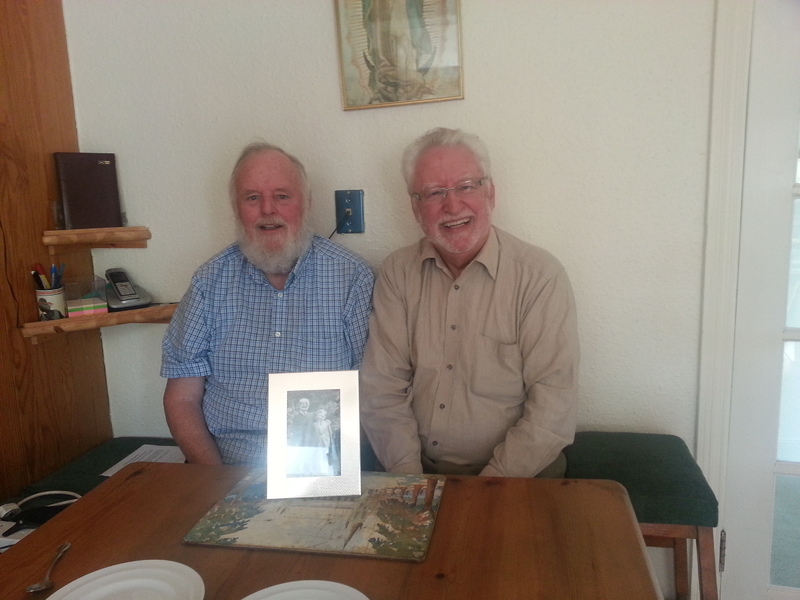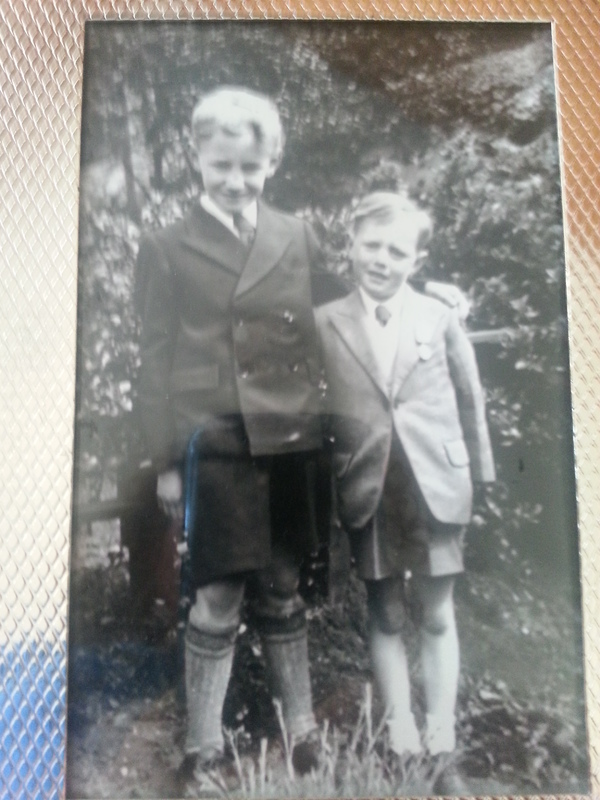Frank Steele and John Steele
Title
Description
Date
Identifier
Source
Rights
Language
Format
Interviewee
Interviewer
Duration
Location
Transcription
Sample:
F S And it’s not just us, you know. Em i-i-it was the way we went about things. I, I mentioned earlier about the big railway bridge. That was a huge dividing line on the Lower Road.
J S Above The Bridge and Below The Bridge.
F S Yeah -- you were either Above The Bridge or Below The Bridge. You were born into one tribe or the other, and there was nothing you could do about it.
M S [laughs]
J S And you couldn’t mix.
F S You couldn’t, no, no, no. We went to school together, we did -- we were in the Scouts together, but basically you were either Above The Bridge or Below The Bridge, and we went to war with each other, we played games against each other --
J S Matches.
F S -- we had stone battering [laughs] against each other.
J S Yeah.
F S Em I, I remember one time -- and I suppose this now might shock people today, but I remember that there was a very intense Above The Bridge-Below The Bridge war in em -- I forget what summer it was. And I remember we, we captured Gully.
J S Oh Gully. [laughs]
F S We captured Gully and we tried him. He was from Below The Bridge, and we tried him and naturally we found him guilty and then we decided we’d have to execute him, so we tied him to a pole and we shot him with skeories.
J S Yeah.
F S Yeah, do you know the red, the -- what are they, what’s their proper name?
J S Eh --
F S The red --
J S Hawthorn.
F S Hawthorn, red hawthorn berries. You know?
M S How did ye shoot him?
J S Catapults.
F S With a little catapult.
M S And would ye have made the catapults yerselves?
F S Oh absolutely. Absolutely.
J S Ah of course. Yeah. Jeepers.
M S How would ye make the catapults?
J S You just get a bit of stick --
F S A fork of stick. [laughing]
J S A fork of stick and a -- put the, the elastic between it and that was it.
F S Yeah.
M S Would --
J S We bought nothing because there was nothing there for us to buy.
F S Yeah. And there was no money to buy it either.
J S Everything we made -- No, everything we played with, we made.
F S Mm.
J S Like a great place I can remember down was Dwyers.
F S Yeah, oh that was unbelievable.
J S Was it Woodhill or something? I, I --
F S It was one of the old merchant houses of Cork, Woodhill Villas.
J S Yeah, that’s right. But down below it was just a haven for kids.
F S Yeah.
J S There was a football pitch belong to Saint Patricks who we were all involved with.
F S Yeah.
J S Then there was a wood, I suppose, well to us twas a wood anyway, probably only a [scart? 15:40] really.
F S Well I suppose -- originally, I would say it was actually a landscaped garden because -- Remember the place we used call the Fort? The round -- that actually was a lake, a little artificial --
J S That thing -- the roundy -- Yeah. I often wondered what that was.
F S -- pond, you know? And I don’t know if you remember but there were a lot of unusual trees.
J S There was, yeah, yeah.
F S And I, I’d say they were deliberately planted because I forget which of the families lived in the actual big house -- and it was a big house --
J S Colossal.
F S In our time ‘twas done in flats so to speak, you know? But it was one of the great big houses of Cork that are all down that side of Montenotte on down into em Little Island, on that side of the road, you have one big house after another, you know. So that, that was those grounds. But they, they were absolute heaven.
J S Yeah.
F S We would head off about ten in the morning --
J S We were always cowboys and Indians.
F S Yeah, cowboys and Indians. [hiccup]
J S I can remember actually, one thing sticks out in my mind. I was on the opposite one to you, of course.
F S Yeah.
J S And whatever anyway, you threw your spear and the spear just went ‘Boom’ [mimes spear hitting him] and I just went -- ‘boom’ --
F S [laughs]
J S But like -- didn’t know about the -- didn’t even think about the thing coming up [gestures to indicate a swelling coming up on his forehead], got up, wanted to kill him straight away.
F S [laughs]
J S Had to get out me bow and arrow and let him have it. [laughs]
M S How come ye’d end up on opposite sides in games? Just randomly like?
F S That’s just the way it was.
J S Yeah, well -- Yeah, and --
F S Brothers usually separated.
J S In things like that, yeah.
F S Because like we didn’t think it through but like if we didn’t separate then it could become something else.
J S Yeah.
F S It could be family A against family B.


